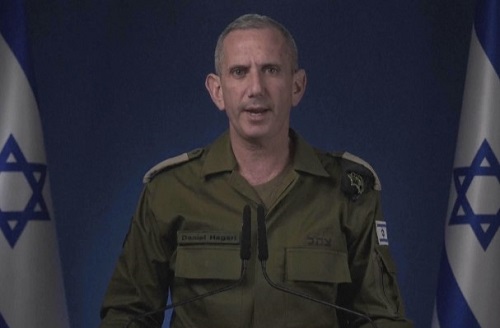DUBAI, United Arab Emirates (AP) — Israel pounded Iran with a series of airstrikes early Saturday, saying it was targeting military sites in retaliation for the barrage of ballistic missiles the Islamic Republic fired upon Israel earlier this month. Explosions could be heard in the Iranian capital, Tehran, though the Islamic Republic insisted they caused only “limited damage.”
The attack risks pushing the archenemies closer to all-out war at a time of spiraling violence across the Middle East, where militant groups backed by Iran — including Hamas in Gaza, and Hezbollah in Lebanon — are already at war with Israel. It also marked the first time Israel’s military has openly attacked Iran, which hasn’t faced a sustained barrage of fire from a foreign enemy since its 1980s war with Iraq.
Israel’s hourslong attack ended just before sunrise in Tehran, with the Israeli military saying it targeted “missile manufacturing facilities used to produce the missiles that Iran fired at the state of Israel over the last year.” It also said it hit surface-to-air missile sties and “additional Iranian aerial capabilities.”
“The regime in Iran and its proxies in the region have been relentlessly attacking Israel since Oct. 7 … including direct attacks from Iranian soil,” Israeli military spokesperson Rear Adm. Daniel Hagari said in a prerecorded video statement early Saturday. “Like every other sovereign country in the world, the state of Israel has the right and the duty to respond.”
Iran’s military said the strikes targeted military bases in Ilam, Khuzestan and Tehran provinces and caused “limited damage,” without elaborating.
Initially, nuclear facilities and oil installations all had been seen as possible targets for Israel’s response to Iran’s Oct. 1 attack, but in mid-October the Biden administration believed it had won assurances from Israel that it would not hit such targets, which would be a more severe escalation.
Explosions heard across Tehran
Iran’s state-run media acknowledged blasts that could be heard in Tehran and said some of the sounds came from air defense systems around the city.
But beyond a brief reference, Iranian state television for hours offered no other details and even began showing what it described as live footage of men loading trucks at a vegetable market in Tehran in an apparent attempt to downplay the assault.
A Tehran resident told The Associated Press that at least seven explosions could be heard in the first wave of attacks, which rattled the surrounding area. The resident spoke on condition of anonymity for fear of reprisals.
As explosions sounded, people in Tehran could see what appeared to be tracer fire light up the sky. Other footage showed what appeared to be surface-to-air missiles being launched.
Iran closed the country’s airspace early Saturday, and flight-tracking data analyzed by AP showed commercial airlines had broadly left the skies over Iran, and across Iraq, Syria and Lebanon.
The White House said President Joe Biden had been briefed and would continue to receive updates.
In Syria, the state news agency SANA, citing an unnamed military official, reported missile fire targeting military sites in the country’s central and southern region. It said that Syria’s air defenses had shot some of the missiles down. There was no immediate information on casualties.
Missile attacks by Iran led to Israeli assault
Iran fired a wave of missiles and drones at Israel last April after two Iranian generals were killed in an apparent Israeli airstrike in Syria on an Iranian diplomatic post. The missiles and drones caused minimum damage, and Israel — under pressure from Western countries to show restraint — responded with a limited strike it didn’t openly claim.
But after Iran’s early October missile strike, Israel promised a tougher response. Israeli Prime Minister Benjamin Netanyahu immediately said Iran had “made a big mistake.”
A forceful Israeli strike on Iran risks further entangling the U.S., which maintains a large troop presence in the Persian Gulf and has helped Israel defend itself against attacks by Iran and its proxies.















Leave a Reply